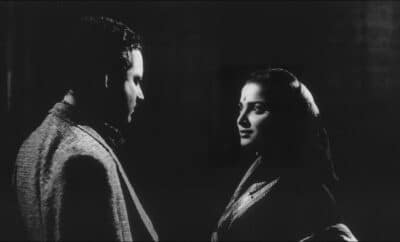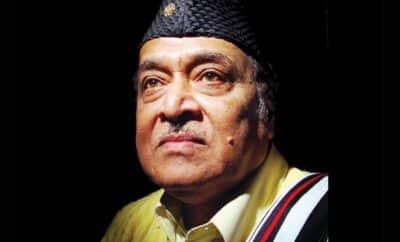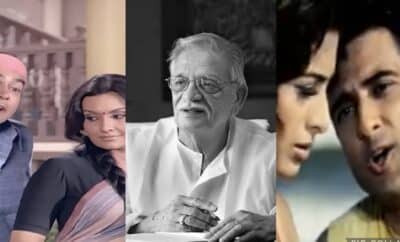Collections
Shakeel Badayuni and Naushad – The Prolific Partnership
When we speak of a good composition, mainly the tune, the orchestration and the singing leave an imprint on our minds. We tend to remember many songs due to their musical values, even if the lyrics aren’t so impressive. Lyrics are often a somewhat ignored element. However, there are many golden era lyricists, whose lyrics are remembered as much as the music. For example, we can never forget the likes of Shailendra, Gulzar, Majrooh Sultanpuri, Hasrat Jaipuri and Sahir Ludhianvi for the astounding pieces of poetry that they have created in varied styles. We cannot of course miss another eminent lyricist who certainly deserves a mention in this list – Shakeel Badayuni.
Born as Shakeel Ahmed on 3rd August 1916 in Badaun, Uttar Pradesh, Shakeel Badayuni got training of Arabic, Urdu, Persian and Hindi from his father, who was a priest. Influence of a distant relative Zia-ul-Qadiri Badayuni, who was a religious shayar, and contemporary environment of Badaun aroused his inclination to poetry. During his college life, he started participating in inter-college and inter-university mushairas. While he was working in a government department in Delhi, he was invited to a mushaira in Mumbai in early 1946. He was spotted by the renowned producers A.R. Kardar in the event, who gave him a chance to pen the songs for his movie Dard (1947), the soundtrack of which was being composed by Naushad, who was an established composer by then. Songs of Dard, particularly the song “Afasana likh rahi hoon dil-e-beqarar ka” sung by Uma Devi (Tun Tun), proved to be very successful. Naushad was thoroughly impressed with Shakeel’s poetry and recommended him for a few other films. They worked together on another film, viz. Naatak in 1947. According to some accounts, as Shakeel wrote only 4 out of 10 songs in Naatak and all the songs in Dard, Naatak could be his first movie in which he was tested and then given all the songs in Dard. Whichever claim is correct, the fact remains that Shakeel’s career in Hindi cinema started in 1947, and so did his long-lived association with Naushad. Shakeel and Naushad got along with each other so well, that their partnership went on almost uninterruptedly till 1968. They became inseparable from each other, so much so that one cannot think of Naushad’s music without Shakeel’s lyrics. They went to become closest of friends even in personal life.
As Shakeel’s association with Naushad must have kept him busy sufficiently, he worked with only a few other composers. Ghulam Mohammed, Hemant Kumar and Ravi were the composers with whom he predominantly worked besides Naushad. Though he is remembered mostly for his songs with Naushad, he has written some memorable songs for the other composers as well.
In the initial years of Shakeel’s career, the landscape of film music was dominated by the formidable presence of the progressive poets like Sahir Ludhianvi, Majrooh Sultanpuri, Kaifi Azmi and Jaan Nisar Akhtar. Shakeel however chose to keep away from the socially engaged purposive poetry that these progressive poets were engaging in, and preferred continuing as a romantic shayar instead. Though Urdu was his mainstay, he has written songs in chaste Hindi and in some regional dialects of Hindi as well.
As a major part of his work is attributable to his lasting partnership with Naushad, let us have a look at a few of their joint songs.
1. Afasana Likh Rahi Hoon (Dard – 1947)
This is one of the first film songs that Shakeel wrote and was a major hit. His poetic proficiency marked by simplicity is quite evident here. Uma Devi, who is more popular for her comedy roles in Hindi cinema (played under the pseudonym Tun Tun) has effectively expressed the agony of the heroine through her rendition under Naushad’s baton. This song sheds lights on her singing proficiency, which she could not unfortunately carry forward for long.
2. Suhani Raat Dhal Chuki (Dulari – 1949)
This is the song that announced the arrival of a playback singer with outstanding calibre, with a fresh voice, Mohammed Rafi. It was one of Rafi’s earliest hits. The haunting tune adorned with guitar and temple blocks among other instruments and Rafi’s poignant rendition transports you to a different world. Shakeel’s words efficaciously describe the pain of the eternal wait for the beloved.
https://www.youtube.com/watch?v=Rw_jNbSVDGk
3. Man Tarpat Hari Dharshan Ko Aaj (Baiju Bawra – 1952)
Baiju Bawara is undoubtedly one of Naushad’s and Shakeel’s best joint works. Though all the songs in the soundtrack are euphonious, the Rafi solo “Man tarpat hari darshan ko aaj” based on raag Malkauns stands out. The masterpiece is the outcome of sheer genius of Naushad’s rich musical acumen, Rafi’s mature and proficient rendition and Shakeel’s suitable words in pure Hindi. This song – a Krishna bhajan – composed, written and rendered whole heartedly by the three Muslim artistes – is one of the best examples of the true secularity of India!
4. O Gaadiwale, Gaadi Dheere Haank Re (Mother India – 1957)
Another landmark film for the duo Shakeel and Naushad in the 1950s was Mehboob Khan’s Mother India. The soundtrack of the film has rustic songs expressing assorted emotions in a countryside atmosphere. Naushad’s folksy tunes were supported by Shakeel’s lyrics written with agrestic simplicity. The song “O gaadiwale, gaadi dheere haank re” expressing playful romance in the voices of Mohammed Rafi and Shamshad Begum is a good example.
5. Pyar Kiya To Darna Kya (Mughal-E-Azam – 1960)
The discussion about the joint repertoire of Naushad and Shakeel would be certainly incomplete without the mention of K. Asif’s magnum opus Mughal-E-Azam. The duo has created the marvellous composition, the flagship song “Pyar kiya to darna kya” by spending a sleepless night. As this was going to be the highlight of the film, Naushad wanted to compose a special song for the situation. He locked himself in a room with Shakeel in the evening. After struggling a lot to find the correct opening, Naushad suddenly remembered a Poorvi folk song “Prem kiya kya chori kari”; and this was it! Shakeel picked up the folksy phrase and polished it to create the bold expression of love with aplomb and a rebellious attitude. The next day was already at the doorstep by the time the duo finished the creation of this masterpiece.
6. Nain Lad Jai Hai (Ganga Jumna – 1961)
This song is the rustic expression of falling in love, proficiently penned in the Poorvi dialect by Shakeel. Using his mastery over folk music, Naushad gives us a zealous and foot tapping melodious experience filled with innocence in collaboration with Rafi. The tragedy king Dilip Kumar’s dance is the cherry on the cake.
7. Mere Mehboob Tujhe Meri Muhabbat Ki Kasam (Mere Mehboob – 1963)
The iconic title song of the movie Mere Mehboob has two versions – one sung by Rafi and the other by Lata Mangeshkar. The Rafi version is a quintessence of the Naushad – Shakeel – Rafi partnership. The 7 plus minutes long version is penned by Shakeel in Urdu dominated Hindi, perfectly expresses the hero’s urge to again meet his love, whom he has seen only once. Naushad’s tune is based on raag Jhinjhoti.
8. Ek Shehenshaah Ne Banwa Ke Haseen Taj Mahal (Leader – 1964)
Leader is Naushad’s yet another mellifluous soundtrack adeptly supported by Shakeel’s lyrics expressing a host of emotions including aesthetic romance, playful romance, defiance in love and patriotism. In “Ek shehenshah ne banwa ke haseen Taj Mahal”, Shakeel describes the beauty of one of the greatest monuments of love, Taj Mahal through Urdu dominated lyrics, tactfully connecting it to the romance of the onscreen pair. Naushad’s composition based on raag Lalit and apt rendition by Lata and Rafi coupled with the lyrics build another beautiful musical monument of love for us.
9. Koi Sagar Dil Ko Behlata Nahin (Dil Diya Dard Liya – 1966)
This is a poignant ghazal written by Shakeel, sung by Rafi, picturised on Dilip Kumar; and of course, composed by Naushad. All of them express the pang of the heartbreak very effectively through the words, rendition, acting and composition respectively.
10. Kal Ke Sapne Aaj Bhi Aana (Aadmi – 1968)
Aadmi was one of the last films on which Shakeel and Naushad worked together, before Shakeel’s demise in 1970. The soundtrack had a few melodious songs rendered by mainly by Rafi and Lata. The mellisonant song “Kal ke sapne aaj bhi aana” crooned sweetly by Lata, penned by Shakeel in simple Hindi and composed by Naushad in a honeyed tune in his usual style beautifully expresses the delicate feminine feelings of yearning for the beloved.
This sensuous shayar kept on unwaveringly painting romantic word pictures filled with simplistic beauty, mainly in association with Naushad, almost until he breathed his last on 20th April 1970 in Mumbai.




dm
August 3, 2021 at 9:50 am
so eloquently written … ?
Yogesh Kale
August 3, 2021 at 11:37 am
Thanks DM 🙂
Preeti Paliwal
August 3, 2021 at 2:54 pm
All songs are a treat to the soul
Yogesh Kale
August 3, 2021 at 8:11 pm
Agree, Preeti ji!
Madhupati Sharma
August 3, 2021 at 8:47 pm
Another refreshing piece celebrating the Kohinoor pair was a wave of breeze carrying sweet melodies.
So many gems from diamond Jubilee films, Golden jubilee films and Silver jubilee films from most celebrated pair makes it a difficult to choose. You did enough justice.
Ram aur Shyam , Deedar, Kohinoor alongwith Amar and Shabab came in mind.
Suguna Kannan
August 3, 2021 at 3:37 pm
Beautifully written …its true that when listening to songs we hardly think of the lyricist or the music composer! Most people enjoy the depiction or the appropriateness of the words to the situation and how it has been visualized. You have highlighted some beautiful compositions of these incomparable duo!
Yogesh Kale
August 3, 2021 at 8:11 pm
Thanks, Suguna ji!